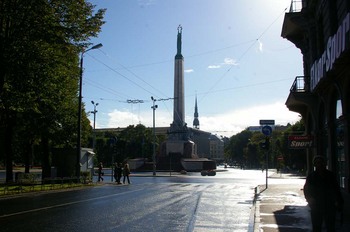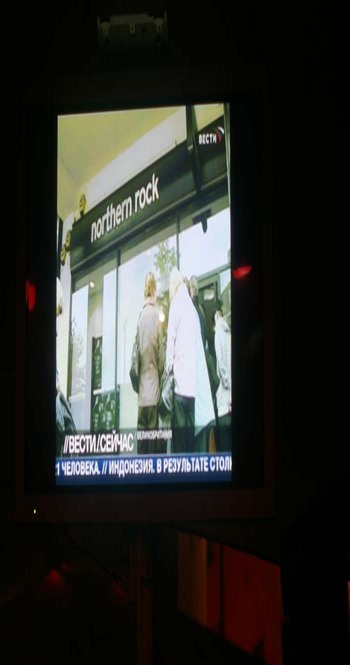We are developing the social individualist meta-context for the future. From the very serious to the extremely frivolous... lets see what is on the mind of the Samizdata people.
Samizdata, derived from Samizdat /n. - a system of clandestine publication of banned literature in the USSR [Russ.,= self-publishing house]
|
This is a pretty good yarn explaining to the layperson how exactly we moved from a period when the financial markets only ever seemed to go up to the time, now, when there are long queues of anxious customers trying to pull their money out of mortgage lending and savings firm, Northern Rock. Hedge funds have lost money. Weird-sounding entities called ‘SIV-lites’ have lost cash (the absurd jargon of financial markets never fails to amaze me). I do not share the view of some Jeremiads that this saga will bring about a recession – although I do not discount that possibility – but the pace of the UK economy is bound to slow down. Suddenly, this present government is going to find it a lot harder to pay for all those new public sector sinecures it has created over the past 10 years – possibly as many as a million public sector jobs. Slower growth will cut into revenues.
The Northern Rock saga has jolted financial markets so much that the US equity market today fell because of the situation. Normally, the UK stock market takes its lead from the US, not the other way around. By coinidence, meanwhile, Alan Greenspan, the former chairman of the US Federal Reserve, has been plugging his memoirs and airing his views about the current problems. Like a lot of people, I take a less than reverential view of Greenspan, although I can see his many fine qualities too: he is a good economist, pretty sound on markets as such folk go, but he abandoned his old, gold-bug principles a long time ago and was a pretty “seat-of-the-pants” sort of Fed head, making up economic doctrine almost, it seemed, on the hoof. It is a bit rich, frankly, for Greenspan to bash Bush for the tax cuts (one of the few good things that Dubya did as President, actually). Greenspan operated a relatively loose interest rate regime and this fuelled the lending practices that have come back to haunt us, especially the whole sub-prime debt Snafu. Cheap money that is detached from economic reality begets trouble. As a man who once learned his economics in the circles of Ayn Rand and Ludwig von Mises, it is a shame that even he could not understand this, or if he did, act upon it.
I have said it before but I repeat it here: it is high time that the cult of the detached, Olympian central banker setting interest rates for whole land masses was ended. Here is the classic statement of why central banks with monopoly rights of currency issuance keep coming a cropper.
…. of what we are up against:
If Labour had suggested the return of Credit Controls can you imagine the wails of protests from the Tories with their cries of ‘You can’t buck the market’ and ‘We want to be free’ and other libertarian bollocks like that.
– a commentator on Guido Fawkes’ blog.
In the lexicon of some people who can be regarded as within the Westminster village, ‘libertarian’ is a pejorative modifier, and, “We want to be free,” is a discreditable sentiment.
In between getting depressed about the way things are going back in London, it is worth thinking about things that have improved in the last couple of decades. This city, with its beautiful Art Nouveau architecture (much of it designed by Mikhail Eisenstein, father of Sergei) was part of the Soviet Union a mere 20 years ago, with all the bleakness and tyranny that this implied. Today, it is modern and that is in the past, although still occasionally visible in the distance.
I can fly here from London for not much more than £50 return. Rather more importantly, Latvians are free to fly to London for not much more than £50 ($100 US) return, and free to live and work in the UK, and many other places.
The beer here is excellent, and the coffee not quite so excellent (a northern European thing in both cases, I think). One can sit outdoors in beer garden in the evening, listening to live music, drinking beer, and watching a TV news channel that the proprietors of the bar have provided for patrons. It is like being in many other places, other than that the languages and channels are different. Even in Germany one often seems to find oneself watching Sky News or CNN in English. Not so much here.
Here, despite the similarity of the stories, there is still some sense that there is a bear in the room. On the other hand, watching a Chelsea game with commentary in Russian seems perfectly right, somehow, so I suppose the invasion has gone both ways.
(Click for larger versions of the above photographs).
Correction: When I first posted this I wrote “Art Deco” when I meant “Art Nouveau”. Also I misspelled Mikhail Eisenstein’s name. Apologies. Must get more sleep.
Remembering one great Kiwi. On September 15, the Battle of Britain was won.
Some aviation eye candy.
I say thank God for government waste. If government is doing bad things, it’s only the waste that prevents the harm from being greater
– Milton Friedman
When the Labour party came into office in 1997, government was already vast. Mr Major, the Conservative Prime Minister, had allowed government Welfare State spending to greatly increase, “we have spent more money than Labour promised to spend” was his boast, and the tide of European Union required regulations was in full flood.
Since 1997. after an initial lull, government Welfare State spending has continued to increase at a tremendous rate, taxes have greatly increased (and become vastly more complicated ) and most of the few limitations (the so-called “opt outs”) that Mr Major put on the flood of EU required regulations have been removed. There were also “little” things under the Labour government – like the looting of the private pension funds via a tax increase first considered by the ‘conservative’ government headed by Mr Major, the re-nationalization of the railways (most British people do not seem to know that “Network Rail” is 100% government owned) and the selling off of most of the nation’s gold reserves for fire sale prices.
Mr Brown.the current Prime Minister, has been in charge of the Labour government’s economic policies over the last ten years and his policy has been to have vastly more government spending, much higher and greatly more complex taxes, and more power for the EU, and so on. And so Mr Brown has been called a ‘Thatcherite’ by this week’s issue of The Economist. Now if you have read the above paragraphs you will understand why I find this… odd.
However, I suppose one could make a case.
After all, between 1979 and 1982 both taxes and government spending vastly increased in the United Kingdom (that was one reason why the world recession was worse here than in other lands – although the BBC broadcast about ‘cuts’ every day of this period of out-of-control government growth. Also in 1986 Mrs Thatcher agreed to the EU ‘Single Market’ which the EU used to require the tide of regulations that has flooded us since then.
However, Mrs Thatcher moved Chancellor Howe and replaced him with Chancellor Lawson. Nigel Lawson, for all his lack of understanding of monetary policy (he greatly expanded the money supply in the late 1980s as part of a scheme to rig the exchange rate between the British Pound and the German Mark, thus creating a boom-bust), at least believed in reducing, and making less complicated, taxes and controlling government spending. The fiscal policy of Mr Lawson, supported by Mrs Thatcher, of lower and less complicated taxes and controlling government spending is the exact opposite of the economic policy Mr Brown has followed. Although Mr Brown, via the “independent Bank of England” controlled by its government appointed board, has, like Mr Lawson before him, vastly increased the money supply in recent years – in spite of his claim not to want to create “boom and bust” (perhaps Mr Brown shares the demented notion, spread by the media and the “education system”, that boom-bust under Mr Lawson was caused by tax cuts).
So either Mr Lawson and Mrs Thatcher were ‘Thatcherites’ or Mr Brown is – Mr Brown and Mrs Thatcher can not both be Thatcherites.
There is also the point that Mrs Thatcher returned to private enterprise many state owned companies – whereas the Labour government has, as I pointed out above, re-nationalized the railways – network rail. Mrs Thatcher also regretted the flood of EU required regulations, feeling that she had been tricked, whereas there is no such regret from the current government. There are also other things, such as the PC policies of the present government (“diversity” and so on), but The Economist may have covered itself here by saying that Labour had “humanized “Thatcherism” by adding “social liberalism” to it – I suppose all this politically correct stuff could be what they mean by “social liberalism”.
However, there was also another part to The Economist article – this was the implication that “Thatcherism” was too free market and, therefore, bad. It was claimed that those Conservatives who wish to return to the principles of limited government and national independence that Mrs Thatcher believed in are fools – who did not understand that the lady won three landslide election victories for quite different reasons.
“Thatcherism”, we were told by The Economist, is understood by the British people to mean wicked “greed” and other such (the vast salary increases for certain people connected with central and local government under Mr Brown, and the vast increases in income for top people in certain politically connected companies and “charities” is somehow not “greed” – perhaps because of their PC “social liberalism”). So the Conservatives would be mad to return to it. The fact that millions of Conservative voters simply stayed at home, and have continued to stay at home, after Mr Major abandoned the principles of Mrs Thatcher was not even mentioned. This is more than a minor oversight.
So, according to The Economist, Mr Brown is a “Thatcherite” (although with a bit of PC “social liberalism” on top), but it would be very silly and wrong for the Conservatives to return to “Thatcherism”.
All very odd.
The BBC is a strong brand for reasons that I dislike. Yet we must recognise that the Corporation straddles a paradoxical position. Some aspects of the Corporation are very good and provide a superior listening or viewing experience to its commercial rivals. Radio channels 3 and 4 may have declined in recent years but the stations still stand above their rivals. The contribution of the BBC to the nation includes a shared cultural and national experience that binds all four nations from Churchill to Blair, until alternatives undermined the cohesive agenda of public-sector broadcasting.
Discussing the parasitical coercion of the BBC’s institutions and its output today in Borough Market with Michael Jennings, the pessimism was palpable. As technology undermines the reasonable expectations of the licence fee, our views diverged. Michael thought that the levy would be converted into a tax, as the Political Class grasped at cultural hegemony. I was more sanguine, viewing the abolition of the licence fee as a cheap populist act for a government facing a public sector borrowing crisis. After all, people no longer ‘need’ the BBC, if they ever did.
This left a quandary. What shall we do with the BBC? And the answer is that the Corporation should be sold to Google. Like all public sector corporations there are strong centres of quirky innovation that could thrive in such a culture. Google has already linked up with the BBC and competes in certain media. Google could derive profit from providing premium services on worldwide subscription. It is a very valuable brand that no private sector owner would wish to dilute. The rush of creative abilties into the private sector from BBC redundancies would stimulate our media industries that are currently stifled by the dominant oligarchies of various publicly funded and regulated channels.
And households would save over one hundred pounds every year. It is a win-win.
Iain Dale has an article in the Telegraph called Gordon Brown is out to destroy the Tories, which makes for interesting reading.
Not surprisingly I have a somewhat different take on what the implications of Gordon Brown’s “ruthless” political tactics would be, should he be successful and finally make the Tory’s collapse once and for all.
Of course Labour want to destroy the Tory party… as it is now ideologically indistinguishable from Labour under the dismal Cameron, they are clearly fighting for the same centre-left statist voters as neither side cares about conservatives.
As a consequence voters who are actual conservatives ideologically have only one genuinely conservative party to vote for and that is not the preposterous Blue-Green caring-sharing hug-a-hoodie tax-and-spend Tory party, it is UKIP. Thus is Gordon Brown well and truly “destroys” the Tory party, it might actually finally force the rump of suicidally loyal Tories to look elsewhere for their psephological fix on election day.
In fact if Brown manages to destroy the Tory party, he will be doing actual conservatives a great service (though in truth it will be ‘Dave’ Cameron and all those who voted for him to be leader who actually destroyed the party, not Brown).
Google comes up with a great prize idea.
“I would never, ever use violence against one of my own children. I usually find that waving the gun around works.”
(A line I remember – I think accurately – from the glorious Lock N’ Load CD by Denis Leary).
In both the USA and UK, much of the debate about how to react to the military situation in Iraq really strikes me as really odd. If a person thinks the available facts indicate we are not doing well against the insurgents, surely the choices should be either:
- Conclude the enemy will inevitably win and no military and political victory is feasible, therefore accept being defeated and get out completely as soon as possible
- Conclude the enemy can be beaten, but not at an acceptable cost, so accept being defeated and get out completely as soon as possible
- Conclude the enemy can be beaten and therefore reinforce to improve the military force levels (i.e. the ‘Surge’) in order to actually win
What does not make any sense to me is any talk of reducing force levels by a person who does not think we have either already won or already been irretrievably defeated… and the stated position of most politicos on both sides of the Atlantic is neither of those things.
Yet surely to argue for any reduction in military force levels in Iraq by anything less that 100% and to argue that things are not going well, is tantamount to saying you support a policy to make the allied military situation even worse.
London is the most expensive place to eat out in the world, even more pricey than Tokyo (a city I really want to visit). Not very surprising, I guess. The sheer financial vibrancy of London fuels this, although it may lose some oomph if the problems in the global markets lead to some job cuts in the investment banking industry.
The key thing I have learned is to be bloody careful about the wine. I find that even in a pricey restaurant, you can get away without paying a fortune so long as you go very easy on the booze. But as soon as you buy anything other than the cheapest plonk in the list, you might as well call in the receivers and sell the house. For this reason I rarely eat out in expensive places, unless it is a special occasion, or eat at my magnificent Tandoori restaurant in deepest Pimlico, which is right next door to my flat. Now that’s luxury for you.
Recommendation: try this place out for a special night out. Great staff.
|
Who Are We? The Samizdata people are a bunch of sinister and heavily armed globalist illuminati who seek to infect the entire world with the values of personal liberty and several property. Amongst our many crimes is a sense of humour and the intermittent use of British spelling.
We are also a varied group made up of social individualists, classical liberals, whigs, libertarians, extropians, futurists, ‘Porcupines’, Karl Popper fetishists, recovering neo-conservatives, crazed Ayn Rand worshipers, over-caffeinated Virginia Postrel devotees, witty Frédéric Bastiat wannabes, cypherpunks, minarchists, kritarchists and wild-eyed anarcho-capitalists from Britain, North America, Australia and Europe.
|






